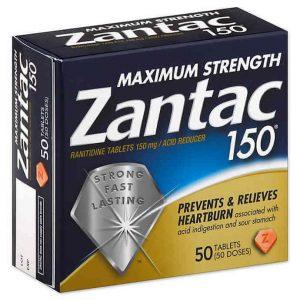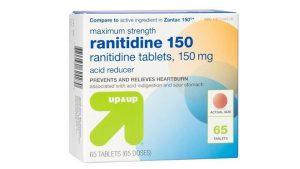
Notice: Morris Bart is no longer accepting new cases related to Zantac (Ranitidine).
In 2020, the FDA investigated the link between Zantac, a popular medication for acid reflux, and NDMA, a carcinogen related to many types of cancer. You may be affected if you’ve taken Zantac or its generic ranitidine.
What Is Zantac?
Zantac is a popular acid reflux medicine that has been on the market since 1981. Available by prescription or over the counter, Zantac or the generic for Zantac, ranitidine, is commonly used to treat heartburn, GERD, ulcers, and other issues related to stomach acid and indigestion. Zantac is now the 50th most prescribed medication in the United States and is manufactured by several companies, including Sanofi, Boehringer Ingelheim, and Sandoz.
Is There a Recall on Zantac?
The FDA issued an official Zantac pills recall in April 2020. However, prior to this, several manufacturers and stores chose to pull the product from shelves while the Zantac cancer risk was investigated. This is not to be confused with Zantac 360, a recent relaunch of the product that features a different active ingredient, famotidine. Studies show that famotidine does not carry the same cancer risks as ranitidine.
The FDA has classified the contamination as “low,” conversely, the levels of NDMA that have been detected in Zantac 150 mg doses are currently between 3,000 and 26,000 times higher than the levels the FDA characterizes as “safe.”
Because the FDA is still actively investigating the link between Zantac and cancer, it’s important for consumers to follow this issue and monitor their own health for adverse ranitidine side effects.
Timeline of NDMA Contamination and Ranitidine Recalls
September 13, 2019: The FDA issued an advisory about NDMA contamination in Zantac and generic ranitidine. That same day, the plaintiffs filed the first lawsuit in California, accusing manufacturers of failing to disclose this risk to patients.
 September 23-25, 2019: Two manufacturers of generic Zantac, Sandoz Inc., and Apotex Corp., voluntarily recall the pills after discovering the NDMA impurity.
September 23-25, 2019: Two manufacturers of generic Zantac, Sandoz Inc., and Apotex Corp., voluntarily recall the pills after discovering the NDMA impurity.
October 23-25, 2019: Manufacturer Sanofi recalls all OTC Zantac containing NDMA. Several manufacturers and stores follow suit, voluntarily recalling ranitidine in all forms, including Novitium Pharma, Lannett Company, Inc., Perrigo Company, Dr. Reddy’s, Walgreens, and Kroger.
November 2019: The FDA recommends manufacturers voluntarily issue a Zantac 150 mg recall that includes any medications with NDMA levels that test above the acceptable daily limit as concerns rise about ranitidine cancer.
November 8-15, 2019: More manufacturer recalls related to NDMA follow, including American Health Packaging, Amneal Pharmaceuticals, Golden State Medical Supply, Precision Dose, Aurobindo, and DG Health
December 4, 2019: The FDA recommends additional ranitidine interactions and NDMA testing.
December 18, 2019: Glenmark Pharmaceutical Inc. voluntarily recalls its ranitidine pills that contained increased levels of NDMA
April 1, 2020: The FDA announces an immediate market withdrawal request for all prescription and over-the-counter versions of ranitidine-related drugs.
What Are the Long-Term Side Effects of Zantac?
Some of the more well-known side effects of Zantac include stomach pain, dizziness, and headaches. However, since the discovery of NDMA contamination in Zantac pills, more alarming side effects have come to light.
Short-term effects of overexposure to carcinogenic NDMA include:
- Fever
- Nausea
- Headache
- Vomiting and stomach cramps
- Dizziness
- Reduced function of the liver, kidneys, and lungs
- Liver damage (liver fibrosis, scarring, or enlargement)
Over time, long-term effects of NDMA exposure may include:
- Increased risk of tumors in the liver, kidney, and lungs
- Increased risk of cancer of the stomach, bladder, colon, esophagus, intestines, kidneys, liver, ovaries, pancreas, testicles, or uterus
- Vitamin B-12 deficiency
- Disorders of the nervous system
- Increased risk of pneumonia
- Liver failure, hepatitis, jaundice
- Skin rashes and hair loss
What Specific Kinds of Cancers Are Caused By Zantac?
While the negative side effects of Zantac vary, the five common forms of cancer potentially linked to the drug are:
- Bladder Cancer
- Stomach Cancer
- Esophageal Cancer
- Liver Cancer
- Pancreatic Cancerciency
Current State of Zantac Legal Claims
Unfortunately for those impacted by the use of Zantac, on December 6th, 2002, the U.S. District Court for the Southern District of Florida granted summary judgment against more than 2,450 plaintiffs who had cases pending in the MDL, ruling that they had failed to produce reliable expert testimony necessary to support their claims. Co-lead counsel for the plaintiffs said in a joint statement provided to Law360 that they are “extremely surprised by this decision given that our scientific and medical experts clearly met the legal standard required under Daubert.”
Co-lead counsel for the plaintiffs is now planning on appealing to the Eleventh Circuit to reverse the ruling. They said it is well-established by scientists, regulators, and the pharmaceutical companies’ own studies that ranitidine degrades into a carcinogen.





